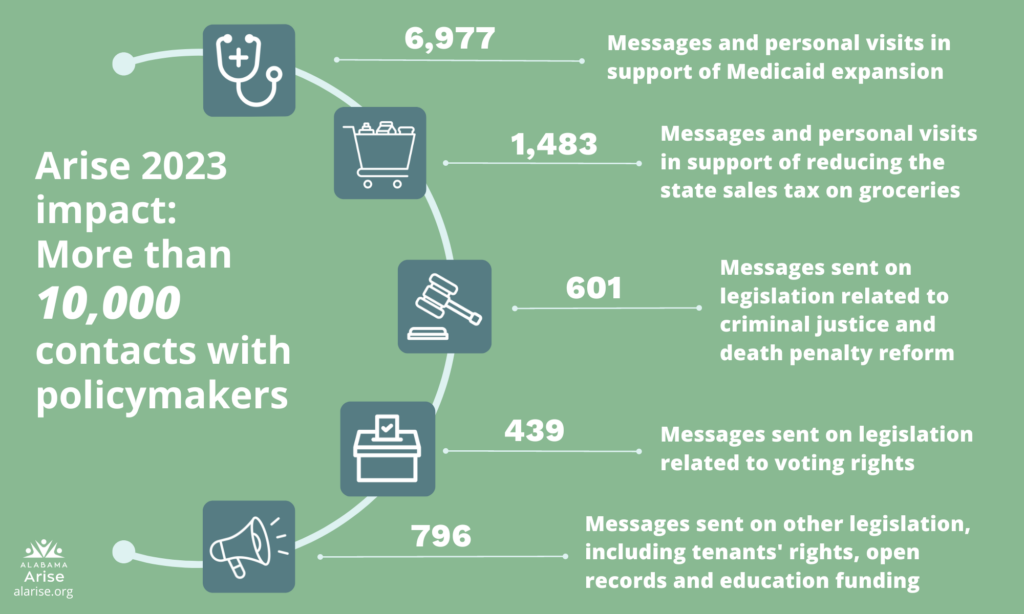June 6 ended one of the most significant legislative sessions ever for Alabama Arise and our supporters. Through timely and persistent advocacy, Arise members helped build a better, more equitable Alabama.
While our work continues, we want to highlight the many important strides this year in our movement for a better Alabama for all – and celebrate Arise members’ role in advancing that goal. This article summarizes some of the key bills on Arise priorities during the Legislature’s 2023 regular session. For information on all bills we tracked this year, visit the Bills of Interest page on our website.
Tax reform
Lawmakers proposed many significant tax reform bills this session. But none will have more lasting significance to Alabamians than reducing the state sales tax on groceries, a longstanding Arise priority. Thanks to phenomenal member advocacy, our state is finally removing part of this regressive tax.
HB 479, sponsored by Rep. Danny Garrett, R-Trussville, became law this year. This legislation will cut the state grocery tax by half in the coming years. This huge victory for tax justice resulted from decades of hard work by Arise members. (See page 1.)
Adequate state budgets
Alabama’s 2024 General Fund (GF) and Education Trust Fund (ETF) budgets are both significantly larger than 2023. The GF budget is about $3 billion and includes a 2% pay raise for state employees. It also includes significant funding increases for Medicaid, mental health care and other state services. The 2024 ETF budget is nearly $8.8 billion, half a billion dollars more than the previous year’s ETF.
HB 295 and SB 202, known as the PRICE Act, were sponsored by Rep. Ernie Yarbrough, R-Trinity, and Sen. Larry Stutts, R-Tuscumbia. These bills would have allowed parents to take tax dollars that otherwise would support local public schools and use them to pay for private schools or home schooling. Arise and other advocates helped defeat this legislation, protecting nearly $600 million of public education funding.
Voting rights
HB 209, sponsored by Rep. Jamie Kiel, R-Russellville, did not pass this session. This bill would have criminalized many efforts to assist voters with absentee ballot applications or completed ballots. Arise and other groups successfully stopped this bill, which passed the House but never reached the Senate floor.
Criminal justice reform
SB 154, sponsored by Sen. Will Barfoot, R-Pike Road, became law this year. This legislation will make it harder for the state to suspend people’s driver’s licenses for failure to pay traffic tickets. Arise and our partners at Alabama Appleseed strongly supported this bill.
HB 24, sponsored by Rep. Reed Ingram, R-Pike Road, passed despite Arise’s opposition. This bill will criminalize asking for money on the side of roads, punishing many Alabamians facing housing insecurity. Federal courts have found similar laws unconstitutional in recent years.
HB 229, sponsored by Rep. Chris England, D-Tuscaloosa, would have allowed resentencing of certain incarcerated individuals sentenced to life imprisonment without parole under Alabama’s Habitual Felony Offender Act. This bill passed the House and gained Senate committee approval, but it never reached the Senate floor. Arise supported this bill and expects a similar one to be filed next session.
Death penalty reform
England’s HB 14 would have required a unanimous jury sentence to impose the death penalty. The bill also would have made the state’s judicial override ban retroactive. This bill received a public hearing but did not leave the committee. Arise supported this bill and expects a similar one to be filed next session.
Other issues
SB 196, sponsored by Sen. Arthur Orr, R-Decatur, would have increased government transparency by improving Alabama’s open records process. This bill passed the Senate and gained House committee approval but did not pass in the House. Arise supported this bill and expects a similar one to be filed next session.
SB 242, sponsored by Sen. Keith Kelley, R-Anniston, would have undermined tenant protections by removing the cap on the amount of the security deposit that landlords can charge to renters. Arise opposed this bill, and it died without reaching the Senate floor.


